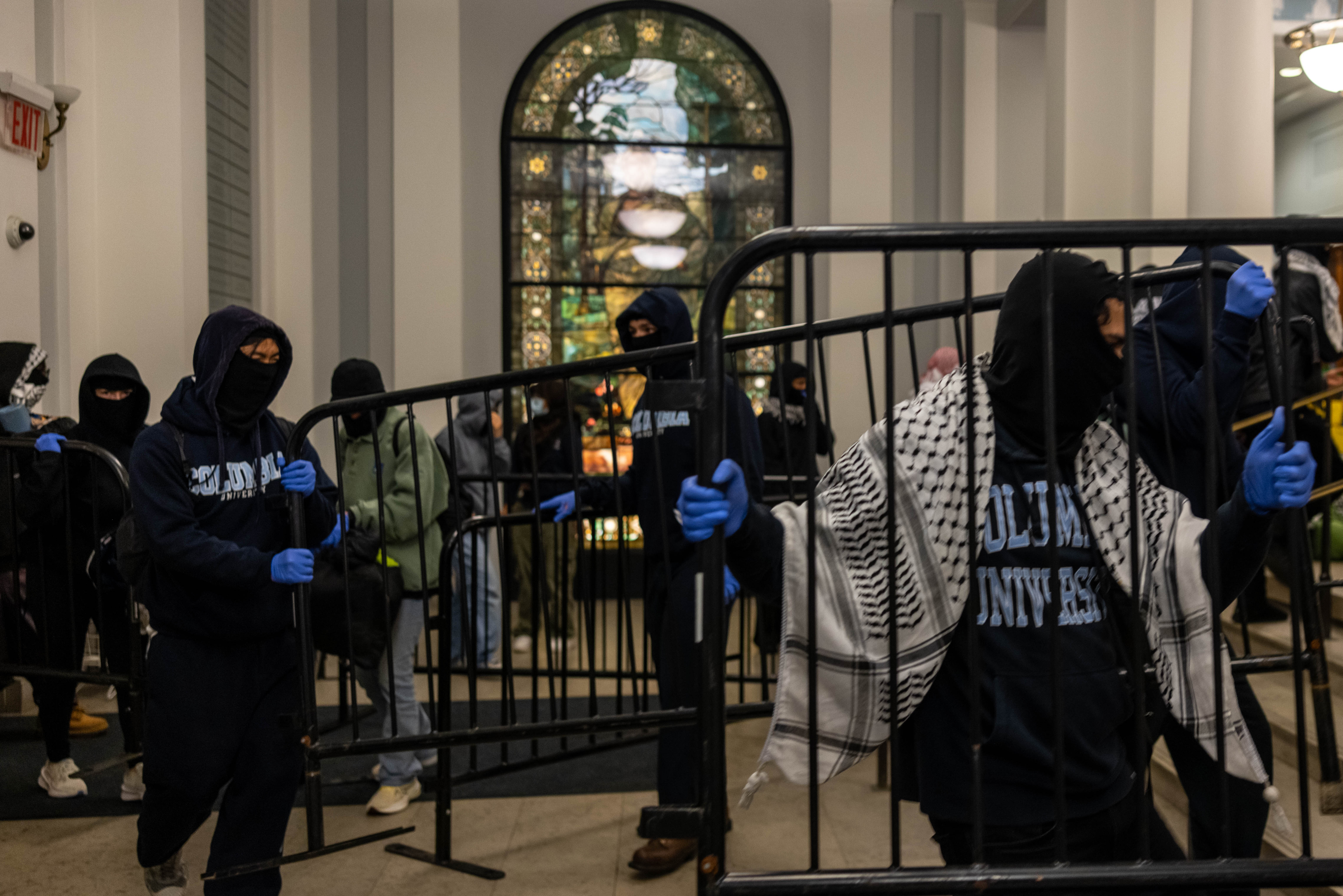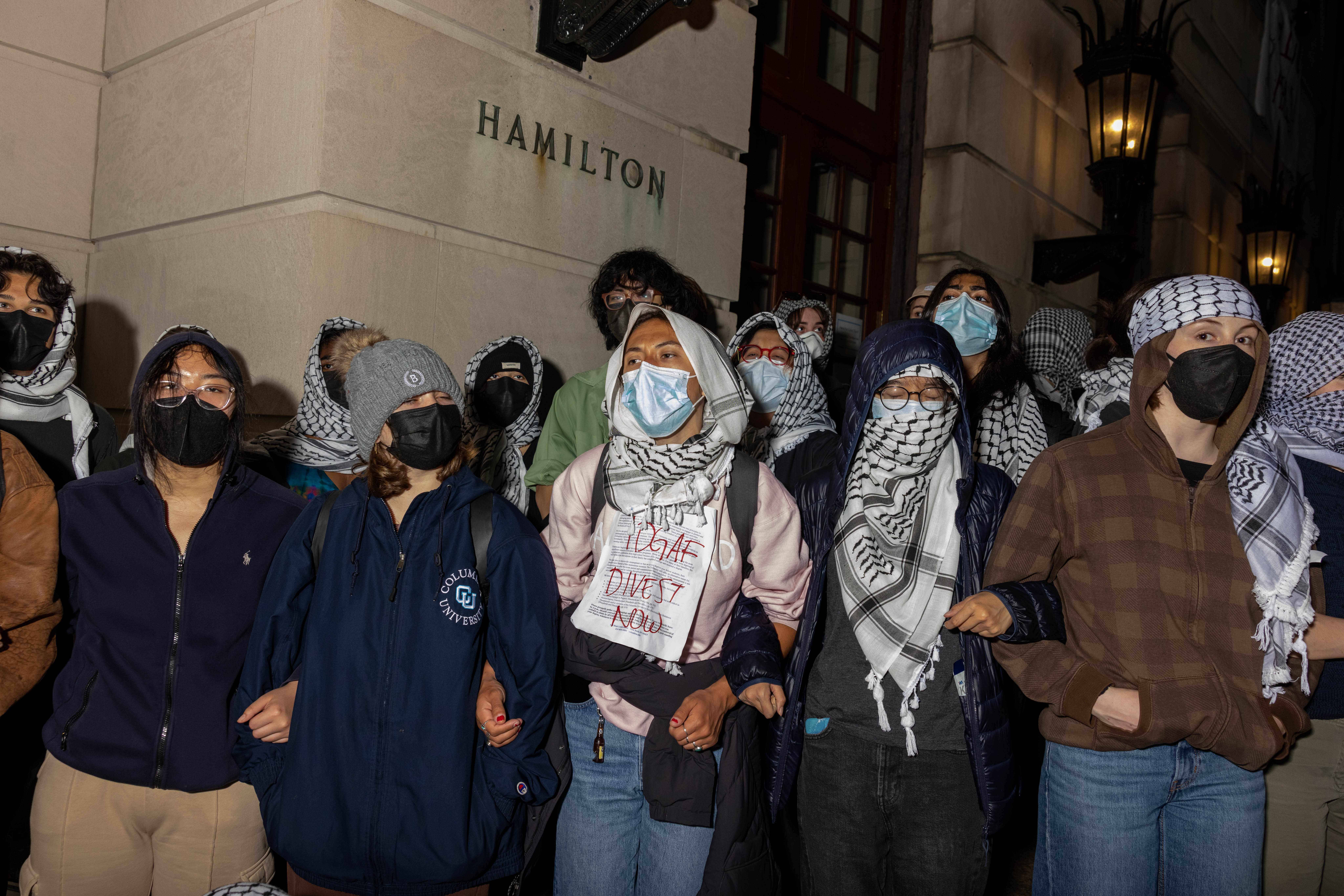Columbia chaos escalates as pro-Gaza protesters seize campus hall and college threatens expulsions
Columbia students took over Hamilton Hall in the early hours of Tuesday morning and repeated their demands for the university to divest from companies linked to Israel
Your support helps us to tell the story
From reproductive rights to climate change to Big Tech, The Independent is on the ground when the story is developing. Whether it's investigating the financials of Elon Musk's pro-Trump PAC or producing our latest documentary, 'The A Word', which shines a light on the American women fighting for reproductive rights, we know how important it is to parse out the facts from the messaging.
At such a critical moment in US history, we need reporters on the ground. Your donation allows us to keep sending journalists to speak to both sides of the story.
The Independent is trusted by Americans across the entire political spectrum. And unlike many other quality news outlets, we choose not to lock Americans out of our reporting and analysis with paywalls. We believe quality journalism should be available to everyone, paid for by those who can afford it.
Your support makes all the difference.The White House condemned Columbia University students who took over a building on campus in protest over the war in Gaza, as protesters warned college leaders they would have “blood on their hands” if they tried to forcibly remove them.
"The president believes that forcibly taking over a building on campus is absolutely the wrong approach," John Kirby, National Security Council spokesman, said on Tuesday.
He added that president Joe Biden believed the occupation was “not an example of peaceful protest.”
His comments come less than a week after the Biden administration signed a bill to send $26.4 billion to Israel to support its ongoing war in Gaza, which has killed more than 34,000 Palestinians, most of them women and children. Over 100 Columbia students were arrested two weeks ago during peaceful protests at the campus.
Students broke into Hamilton Hall in the early hours of Tuesday morning, unfurling banners from the windows and barricading the doors. The hall has symbolic value to the protesters: it was one of several buildings on campus that were occupied during a 1968 civil rights and anti-Vietnam War demonstration on campus.

“This escalation represents the next generation of the 1968, 1985, and 1992 student movements which Columbia once repressed yet celebrates today,” said a statement from CU Apartheid Divest, an activist group that has been leading the protests.
The group said it had renamed the building Hind’s Hall in honour of Hind Rajab, a six-year-old girl who was killed in Gaza in an attack likely carried out by the Israeli army, although it has denied responsibility.
The protesters said they would remain in the building until their demands were met — namely for the university to divest from companies in Israel, provide transparency about its investments, and grant amnesty to suspended students.
An anonymous Columbia University student who spoke to the press on Tuesday called on school administrators to de-escalate the response to protests.
“To Columbia’s administrators and trustees: Please do not incite another Kent or Jackson State by bringing soldiers and police officers with weapons onto our campus,” the student said. “If you do so, student blood will be on your hands.”

Columbia University said in a statement on Tuesday that students occupying the building would face expulsion.
“We made it very clear yesterday that the work of the University cannot be endlessly interrupted by protesters who violate the rules. Continuing to do so will be met with clear consequences,” said Ben Chang, a university spokesperson.
Student protests over the war in Gaza have spread like wildfire across the US in the past week, following the lead set by Columbia University students. The protests have been met with police crackdowns and mass suspensions. Some Jewish students have said the protests have made them feel unsafe on campus, while others are directly involved in the demonstrations.
More than 40 protesters were arrested at the University of Texas at Austin on Monday, as riot police moved in to disperse a protest. Some 50 protesters were arrested at the university last week.
Protesters briefly occupied two buildings at California State Polytechnic University before they were cleared by police on Tuesday. The university said 25 people were arrested and there were no injuries.
The crackdowns across the country prompted a rare intervention from the United Nations High Commissioner for Human Rights, Volker Türk, who said the police responses “appear disproportionate in their impacts.”
“Freedom of expression and the right to peaceful assembly are fundamental to society – particularly when there is sharp disagreement on major issues, as there are in relation to the conflict in the Occupied Palestinian Territory and Israel,” Mr Türk said.
“US universities have a strong, historic tradition of student activism, strident debate and freedom of expression and peaceful assembly, It must be clear that legitimate exercises of the freedom of expression cannot be conflated with incitement to violence and hatred,” he added.
Columbia University said Monday that it had begun handing out suspensions to student protesters after they failed to heed a deadline of 2pm yesterday to leave the encampment, which began on April 17.
Hundreds of students are likely to be impacted by the suspensions, which the university administration announced earlier on Monday after negotiations between the protest organisers and the university broke down.

Join our commenting forum
Join thought-provoking conversations, follow other Independent readers and see their replies
Comments